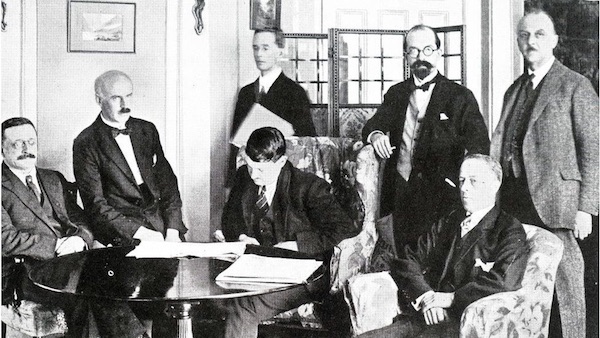
An account by Des Dalton of the first days of the Anglo-Irish treaty negotiations one hundred years ago, which led to the partition of Ireland.
On October 11, 1921, formal negotiations commenced between representative of the Irish and British Governments at 10 Downing St in London, the official residence of the British Prime Minister.
At the opening plenary session, the British Prime Minister, David Lloyd George stated that the British delegation were limited by “public opinion behind them” in what they could concede in reaching an agreement. He said that the Irish side were bound by similar constraints. As the historian Frank Pakenham pointed out, it relived the British delegation of “the necessity of arguing fundamental ethics.” At a stroke Lloyd George presented the British delegation not as independent agents “free to choose their own principles, but as the faithful mandatories of others.”
Replying on behalf of the Irish delegation, Arthur Griffith pointed out “England’s policy in the past has been to treat Ireland as a conquered and subject country. If there is a change in the policy of subordinating Ireland to English interests, then there appears to be possibility of peace.”
That evening Griffith in a letter to the President of the Irish Republic, Éamon De Valera, reported Lloyd George’s opening remarks as well as a providing a summary of the discussions that had taken place. These had mainly concerned definitions of dominion status, Irish neutrality and British demands for naval facilities on the western Irish coast.
The significance of Lloyd George’s attempt to limit the scope of negotiations did not escape de Valera who replied to Griffith “ I note that Lloyd George is just covering again the ground he covered with me. You will have to pick him up soon on this ‘further than this we can’t go’ stunt.”
Both sides had fired their opening salvos. The talks were set to resume on October 13, when the third session and second day of the ‘Treaty’ negotiations took place. According to Frank Pakenham in his history of the negotiations ‘Peace by Ordeal’ “the third session accomplished little.” Most controversy centred on British attempts to wrong foot the Irish delegation by pushing to have the Dáil Courts and public drilling by the IRA shut down.
Arthur Griffith was able to reply that in Sligo the British had occupied both the Victoria Hotel and the Court House, where the municipal offices were located. This forced a climb down by the British and a referral of matters back to the ‘Truce Committee.’
On October 14, the fourth Plenary Session of the ‘Treaty’ negotiations saw the question of the partition of Ulster raised by the British, which came as a surprise to Arthur Griffith and the Irish delegation who did not expect it to be raised for at least another couple of days.
Lloyd George argued on the basis that Ulster was another country. This was refuted by Griffith, Michael Collins and Gavin Duffy on the Irish side. They pointed out firstly that the six counties earmarked for the new northern state, constituted only a portion of the province of Ulster. Griffith pointed out that unionist intransigence was because they knew they had the unqualified support of the British Government to back them up. Collins and Gavan Duffy countered Lloyd George’s argument that partition was a natural fact by pointing out partition was an “artificial difficulty” created by the 1920 ‘Government of Ireland Act.’
The Irish delegation felt satisfied they had put up a strong argument against partition. Griffith made the observation that the British side were “remarkably ignorant of the facts” in relation to Ulster.
However, the British were pleased that the Irish delegation had not refused to even debate an agreement that did not include all of Ulster in an independent Irish state. The die was cast.
![[Irish Republican News]](https://republican-news.org/graphics/title_gifs/rn.gif)
![[Irish Republican News]](https://republican-news.org/graphics/title_gifs/harp.gif)

